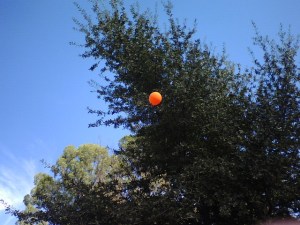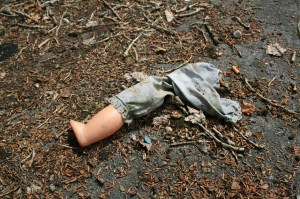Feb. 2, 2016
For some time I’ve toyed with writing about my grandparents and the magic of the Island but I haven’t known where to start. I’m not sure I have a cohesive story. It’s more a collection of memories and impressions.
Today, I have been thinking about thimbleberries. I guess I’ll just start here and see where I end up.
My grandmother Luisa grew up in the North, on an island attainable only by water (or ice) until sometime after WWII, when an airstrip was cleared. Luisa went on to teach grades 1-12 in a one-room schoolhouse on the mainland. Harry, who was predestined to become my grandfather, barnstormed his way north with his best friend; and you can guess what happened next.
Luisa and Harry moved to the East Coast and raised their children near Harry’s extended family. Whether Luisa was more intent on moving towards adventure on the East Coast or away from heartache on the Island is not entirely clear to me. An old maid by the standards of the time, she had been ripe for the picking. I believe she loved my grandfather. I also suspect that, rather than fight for what was hers, she had grabbed at her chance to flee.
Death and scandal had left Luisa in the position of family outsider. When it came time to lay claim to her Papa’s possessions and exercise her rights concerning the family home, she chose to withdraw her claim without fanfare. I am certain she felt bitterness at the time, though she later chewed it to softness. I know this because empathy amplified this bitterness in my grandfather and extruded the excess in comments and gestures which caused my grandmother to blush and squirm. I know this because I can taste it in my own mouth. It has the flavor of unripe persimmon.
I can say with confidence that once she determined to do so, Luisa continued, until death, to work at positive relationships with those who had wronged her, and, in time, with those who had innocently benefited from those wrongs. My beautiful grandmother was a gentle woman–and a gentlewoman–who did not want to hold a grudge against her much younger sister. It was not Darlene’s fault that she was cosseted and petted even as Luisa settled into the role of poor relation. Still, I imagine my grandmother’s kind and circumspect behavior provided both the warmth of kinship and a thorny poke to draw a bead of guilt.
I can also say with confidence that tensions remain to this day. As a young child, I felt frustrated and puzzled at our short, well-managed social calls. We kept a polite distance from the family so as not to wear out our welcome while visiting my grandparents at the house they eventually built for themselves on another part of the Island. It was not long before I grew into self consciousness and entered the awkward games myself.
As did her German father before her, my grandmother endured her losses silently. Her reservoir was, nonetheless, full enough to leak into us. My mother; then my sister Gwen and I; and now my daughters Lindy, Bec, and Claire; have received and transmit Luisa’s melancholy and unfinished business in ever diminishing waves and often without benefit of conscious awareness.
I have lost touch with that branch of the family. I do not doubt that they continue to summer in “the Old House,” as it was called, with no thought of us, as they enjoy their little beach and look across the street any time they please to smile at the Church of Christ, which Papa’s capable and calloused brown hands helped build.
I used to grieve. I had grown up with stories of Papa, and they had become as my own memories. I loved him. He was quiet and good and honorable. He worked hard, felt deeply, and suffered without complaint. His presence echoed throughout the Old House, silently beckoning me as a daughter. He whispered that I belonged there, that I should curl up under the eves at night with cookies and Charlotte Brontë.
As I write this, I know that my grandmother never fully recovered from the loss of Papa Karl. He had been lost to her too many times for it to be otherwise.
Young Luisa lost a part of her father when her mother died. She lost Papa again when she was farmed out to an aunt and uncle in another state. A widower with small children had few options in those times. Her relatives had wanted to adopt her but Papa had said no, he would not give up the “cream.”
My grandmother returned home to lose another part of Papa to Anna, the beautiful, sharp, and too-young woman who dazzled Karl at a time when he desperately needed a helpmate. No shrinking violet, Anna made the home her own and raised their daughter Darlene to be a princess.
Luisa lost Papa twice when his final illness took him. She had not been informed that she should come one last time, and she grieved from a distance without any of his belongings for consolation. He would never know his granddaughter Carol, my mother, or her younger brother. As if these injuries were not enough, Luisa lost her brother, Karl Junior, to Anna as well. Having lived under the same roof as mother and son, they wasted little time on their way to the altar to seal their covenant as husband and wife. I try to imagine what this meant for Darlene.
Generations after Papa’s death, I begrudged my relatives the family property and the stilted cheer which held me at arm’s length. By the time I arrived on the scene, the wagons had long circled Anna and, by extension, Darlene, whose emotional fragility and need for protection were understood as fact.
If there were villains, they are no longer. I say these words, and the taste of persimmon lingers. In truth, the high-strung Darlene became a devoted spouse and the loving, capable mother of four. I suspect now that she was without guile. Her childlike heart, so carefully protected by spectator pumps and silk blouses, was revealed the moment she arrived at the Old House each summer. Her first act, always, was to drop everything, put on her swim suit, and baptize herself in the clear and frigid Lake. I witnessed this ritual several times myself. Her face was unguarded.
This (his)story has grown as wavy as an old window pane. It is as true as I can achieve without stirring up old hurts. Though I experience longing, the longing I feel is rooted in a time which can never return. If I possessed the Old House, I would not have money for regular visits and necessary upkeep. And by this time, the family tree has branched so widely that any gain on my end would spell upset to whole families who have grown numb to the degree of privilege they enjoy. If the tables were turned, it would be my cousins telling this tale.
I last visited the Island 20 years ago, and it was much altered. The town beach was fouled, and the naked red mud of fresh driveways marred the untamed perfection. Perhaps my island is no longer haunted. Perhaps my island no longer exists. At the very least, the ghosts are hiding behind a new face.
The Island had long attracted summer regulars, its harsh winters inhospitable to all but the locals. Aspen by aspen, its soul was sold to the well-heeled few, its mystery giving way to a sort of Newport of the North; and I was struggling with the change. This is progress, I remind myself. Time does not stand still. Surely the Native Americans, now warehoused in reservations, have much more to bemoan than I. What was my paradise if not a despoiled version of their own?
So today I will think only of thimbleberries.
My grandparents eventually returned to the Island and built a house near McDaniel’s Point. At length, Harry had convinced Luisa to return to the Island. He loved, loved the Island, it is true. But he also possessed a streak of pride which would not allow him to feel bested.
My grandmother named their home “Wintergreen,” though it also became known as “the Little Big House.” The uncanny two bedroom, one bath cottage and its detached garage cum guestroom, could accommodate any number of bodies without feeling cramped. As long as some of us agreed to bathe in the Lake. And use the Boston bean pot.
Wintergreen was situated deep in the woods, open sky visible only above the winding drive, the garage and double parking spot, the house with its postage-stamp lawn, and the patchwork series of steps to the lake below. Oh yes, and the ravine which descended along the edge of the property. Due to the climate, the deep shade, and a preponderance of creatures, attempts at traditional gardening were doomed. I recall my grandmother’s judicious transplantation of forest ferns to line the pathway to the house.
The sunniest spot on the property was right at the nose of our station wagon Betsy, stopped, as she was, on the brink of disaster. My father had to pull into the parking spot carefully lest he push past the log boundary, plow through the brush, and tumble into the steep ravine which fed into the lake.
Why tell of that wild green patch which bowed to my grandfather’s pampered Bonneville and tickled the chin of our own family car? Because that was where the thimbleberries grew. We competed for the few precious berries. Too tasty to hoard and too delicate to store, we enjoyed them on the spot, their soft flesh melting on our tongues.
Too soon gone.









